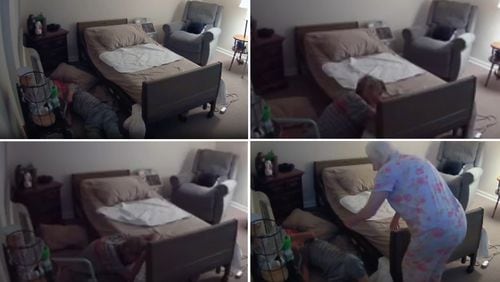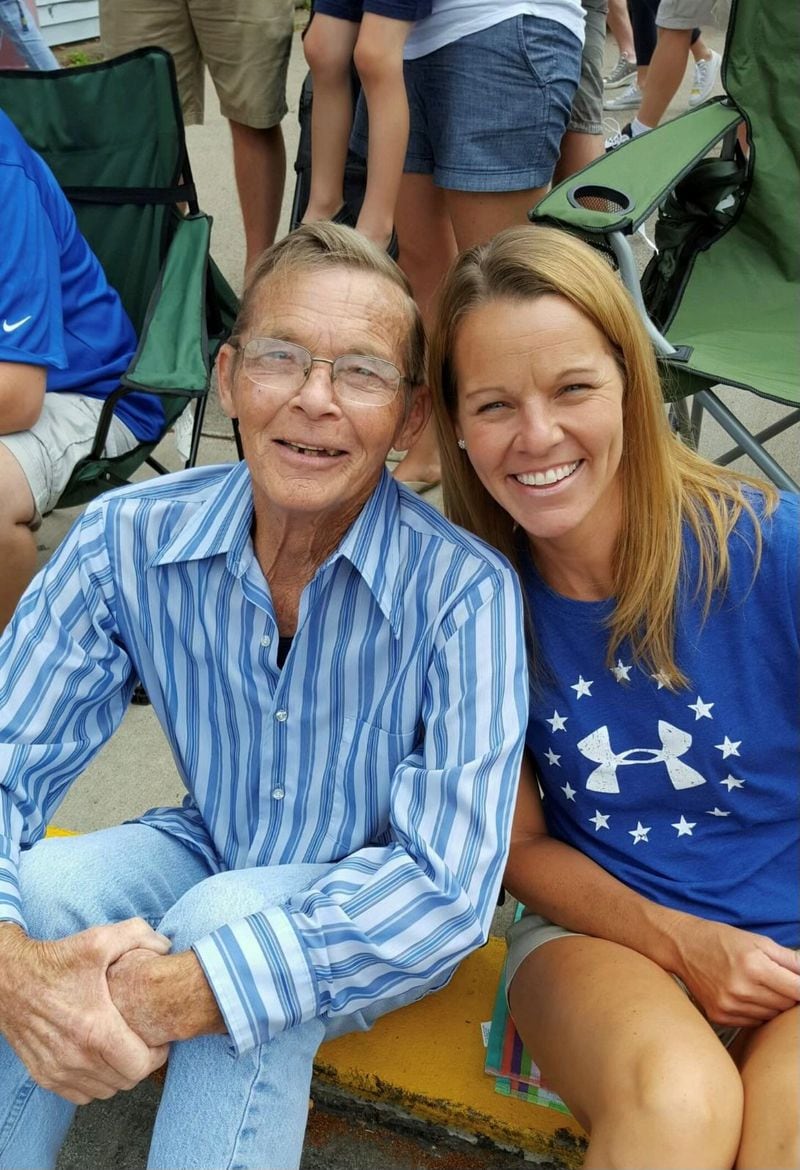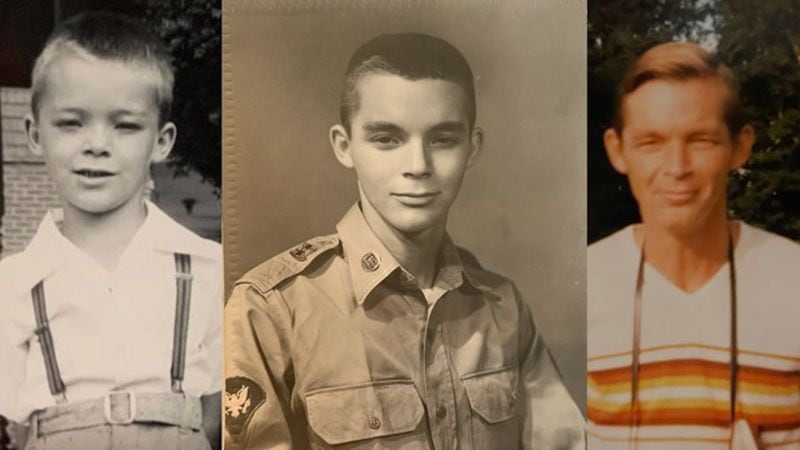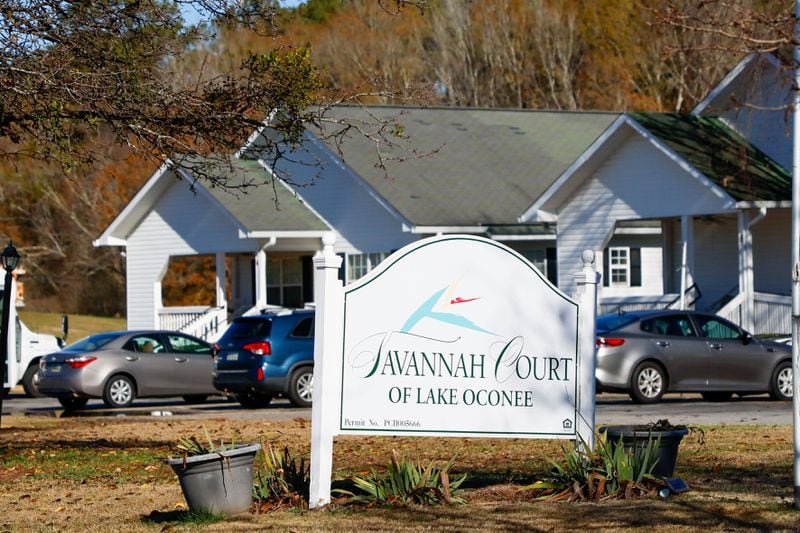When Amy Manville first saw the videos of her dad she thought she was going to throw up.
For nearly six hours on the night of April 29, her father, Robert “Mike” Lintz, was left struggling on the floor of the Memory Care Unit at Savannah Court of Lake Oconee. The incident, which was captured on a Ring camera, shows the 78-year-old in various states of distress as staffers walk in, see him on the floor, and walk out again. His tiny 94-pound frame can be seen clawing desperately to get back into bed as he calls out for help.
“It goes on and on,” Manville said of the agonizing footage that went into the wee hours of the morning. “It’s just a complete disregard for his safety. His well-being. Everything.”
Lintz, who suffered from dementia and was on hospice care, died two days later. He was at the 72-bed personal care facility for a total of seven nights.
While Manville reported the painful episode to the state last year, it wasn’t until The Atlanta Journal-Constitution sent her the inspection report about the event that she learned the extent of the neglect: Three of the staffers watching her dad that night had no competency-based memory care training, as is required by state law.
“They had nothing,” she said, noting the only reason she had brought her dad to the facility was because she was promised staff had specific skills to care for him.
Credit: courtesy of Amy Manville (family photo
Credit: courtesy of Amy Manville (family photo
Her discovery came after an AJC investigation earlier this month that documented over 70 violations at Savannah Court since 2021, including two other deaths and a recent sexual assault. The revelation highlights communication gaps when it comes to informing families and the public about the extent of the harm felt by loved ones.
Manville said she would have never put her father in the home if she had known about all of its problems. Other family members of residents, including the granddaughter of the sexual assault victim, reached out to the AJC after the article ran as well. They each expressed a feeling of being left in the dark by the state and some expressed surprise when learning about the inspection reports that detailed so much of the indignities their loved ones faced.
When asked why families aren’t sent inspection reports following an investigation, Fiona Roberts, a spokesperson with the Department of Community Health, said the reports are subject to legal review and facilities have the right to appeal the findings first.
“For this reason, the Department refers complainants to the online portal where reports can be easily accessed and provides a phone number for complainants to call if they have any questions,” she wrote in an email, adding “The Department website is easily located with an internet search.”
Savannah Court of Lake Oconee and its parent company, Senior Living Management, did not respond to multiple emails and texts sent by the AJC seeking comment.
The AJC’s original investigation looked at Savannah Court and the lack of significant punishment imposed by the state for various safety violations. When violations are found, fines are not always imposed. And when fines have been levied, the state routinely cushioned the impact by breaking up the penalties into monthly payments.
In August, the state threatened to revoke the facility’s license and then entertained an agreement which would allow the home to stay open. Regulators ultimately decided to move forward with a closure hearing earlier this month after the AJC published its investigation. That hearing resumes today.
With the facility’s future on the line, stories like Manville’s point to broader concerns about the state’s failure to protect the public and a lack of transparency and information available to families to help them make informed choices of where to place their loved ones in need of care.
“I think I’ve already dealt with a lot of emotions of dad and him not being here,” said Manville explaining that her attention is moving from a focus on the suffering to accountability.
“Somebody needs to be held responsible for the way they treated him,” she said, before adding: “The way they treat all of them in there, apparently.”
A night on the floor
There is pride in Manville’s voice as she talks about the man her dad was.
Lintz served two tours in Vietnam. In Pennsylvania, where he lived until the last week of his life at Savannah Court, he had worked as a historical restoration carpenter. He loved the outdoors and animals. He raised Manville and her two brothers as a single dad after her parents divorced.
“He was the sweetest little guy that you could possibly imagine,” Manville wrote in one of her emails to state regulators last spring.
Credit: Courtesy Amy Manville (family photos)
Credit: Courtesy Amy Manville (family photos)
In early 2023, Manville was faced with a dilemma many adult children face. Her dad’s health began to decline and she lived 11 hours away in Putnam County. After two mini strokes in February and March that landed him in the hospital, she decided to bring her dad to Georgia. She wanted somewhere close by where she could, as she explains, “put eyes on him every day.”
While not a nursing home, Savannah Court of Lake Oconee — a large personal care home with a special memory care unit — promised that they could take care of him. The marketing director promised that they could meet his needs, according to Manville. It was also the only facility nearby with openings.
Red flags, however, cropped up soon after Lintz moved in on April 24.
In the first few days, the home’s caregivers gave him solid food even though he needed it pureed, Manville said. On one occasion Manville said she found two staff caregivers with their eyes closed in a darkened room. They insisted they were not sleeping.
“This is when I started thinking, wow, where do I have him at?” Manville said.
On the evening of April 29, Manville looked at the Ring video feed she had set up and saw her dad on the floor around 7 p.m. She tried calling the facility but nobody answered, so she drove over. Her dad had been put in his recliner by the time she arrived. She told staff to call her if anything else happened.
Nobody called during the night, but the next morning, on April 30, she was informed her dad had fallen but he was OK. When she came to the facility she found he was covered in bruises and little scrapes. She turned to the video footage. What she discovered, she said, was horrifying.
Over a six-hour-period, into the early morning hours, her father can be seen struggling on the floor, according the state’s inspection report and Manville’s video clips reviewed by the AJC. Staff come in and out of the room, but they leave him on the floor. At one point a staff caregiver comes in, removes a portable toilet that Lintz had accidentally pushed onto himself, and then leaves again. At 4:45 a.m. two elderly residents are seen entering the room and attempting to lift Lintz up onto the bed. They are unsuccessful and eventually leave.
Manville can understand staff may not have wanted to put her dad back in bed because he kept falling out, as video footage from earlier on the evening revealed. Still, she can’t get over the fact that nobody called her during the night. She’s stunned at the way her dad was treated.
The following night Manville sat by his, side not wanting to leave him alone. He died as the sun began to rise.
It was, she said, a horrible death, after a horrible week.
Manville describes an array of emotions in the aftermath. Sadness for suffering her dad went through. Guilt that she fell for the marketing and placed her dad in such a troubled facility. And then anger that this was allowed to happen.
“You just expect people to take care of people like they’re humans, and have compassion,” she said, wiping tears from her eyes. “But he didn’t get that there.”
A death with few answers
Motivated by what she calls “this haunting,” Manville began doing research about the home’s parent company: Senior Living Management. She couldn’t shake the images of Lintz’s tiny body on the floor.
After submitting a complaint on the company’s website, Manville sent the videos. The company assured her they were taking action and people would be fired.
Manville also reported the incident to the Georgia Department of Community Health, which licenses and inspects senior care homes. Two months later DCH sent a letter informing her that its investigation had been completed.
The state reported that the review was “able to support one or more of your allegations,” according to the Aug. 7 letter from Sammy Foster, a regional director of DCH’s personal care home program.
“Thank you for sharing your concerns with us. Please be assured that we will continue to hold this facility accountable for providing safe care,” the letter said.
Foster did not, however, share what allegations were substantiated, or what the state planned to do as a result of the investigation. Nor did Foster share that inspectors had categorized the violations they found as “Level D” offenses, which do not result in fines.
Manville did not see the state’s investigation report until the AJC shared a copy with her this month. The report noted a total of four violations associated with her dad’s case. That’s how she learned that the home failed to conduct a proper care assessment of her dad, didn’t keep a medication administration record and its caregivers had not been properly trained.
Manville had been afraid she didn’t have the skills or expertise to care for her dad. Her biggest fear last spring was that if her dad stayed with her he’d wander out into their horse pasture in the middle of the night.
“Now looking back,” she continued, “I’m like, that probably wouldn’t have been any worse than what he went through.”
Credit: Miguel Martinez
Credit: Miguel Martinez
Experiences like Lintz’s highlight major failures experts see in the assisted living industry, which lacks federal regulations and is monitored by states, with mixed results. While homes like to market and brand themselves as “social facilities,” they are caring for increasingly fragile populations that need — and expect — appropriate care and supervision.
“The family member didn’t leave [their loved ones] at a storage unit or just drop them off at a Days Inn,” said Richard Mollot, executive director of the Long Term Care Community Coalition, a New York-based nonprofit.
Last week Mollot testified at a hearing of the United States Senate Special Committee On Aging on issues within the assisted living sector. A big focus was on the lack of transparency and information across an industry with 30,000 homes and some one million residents served.
“Families and residents should not have to be experts on the rules and the laws and the vagaries of different types of licensure,” he continued.
While Georgia posts DCH inspection reports online, this is not widely publicized and not known by many, especially families navigating the sector for the first time.
“If they have that many violations it should be right up on the wall to let people know when they walk in,” said Manville, similar to a restaurant’s health inspection grade.
Facilities are required to post inspection reports and plans of correction in the facility and on the facility website, according to Roberts. Families that the AJC spoke with never saw such reports posted. The AJC could not find state regulatory documents on Savannah Court’s website.
‘a poor option or a bad option’
A state administrative court hearing to determine whether Savannah Court should have its license revoked is set to resume today.
During opening statements earlier this month, the facility’s attorney Chesley McLeod stressed that a closure would be catastrophic for families and residents who would have to scramble to find new homes, and staff members who would lose jobs.
An attorney for the state, Jason Reeves, acknowledged that the closure of Savannah Court would create a void in services in a community with few options, but that this was not a reason to keep open a facility that has been flagged so many times for repeated violations.
“We believe that the community’s only option can’t be a poor option or a bad option,” he said.
For Manville, the threat of closure feels like the first repercussion with teeth after so many indignities. It also appears to be the only thing that has put pressure on the facility to change or do right by residents and their families.
In May, after her dad’s death, Manville said, a Senior Living Management executive promised her the company would refund Manville the $6895 she had paid for her dad’s seven nights at the facility. A portion of the money was reimbursed in June, but when Manville reached out several times over the summer for the remainder, her emails went weeks without an answer.
On August 21, the company wrote back apologizing for the delay.
“Please accept my apology, you should have received or will be receiving [the remaining refund] any day. You have been more than patient,” wrote Tori Gober, the company’s corporate director of operations.
Savannah Court had received its revocation notice from state regulators five days earlier.
About the Author









